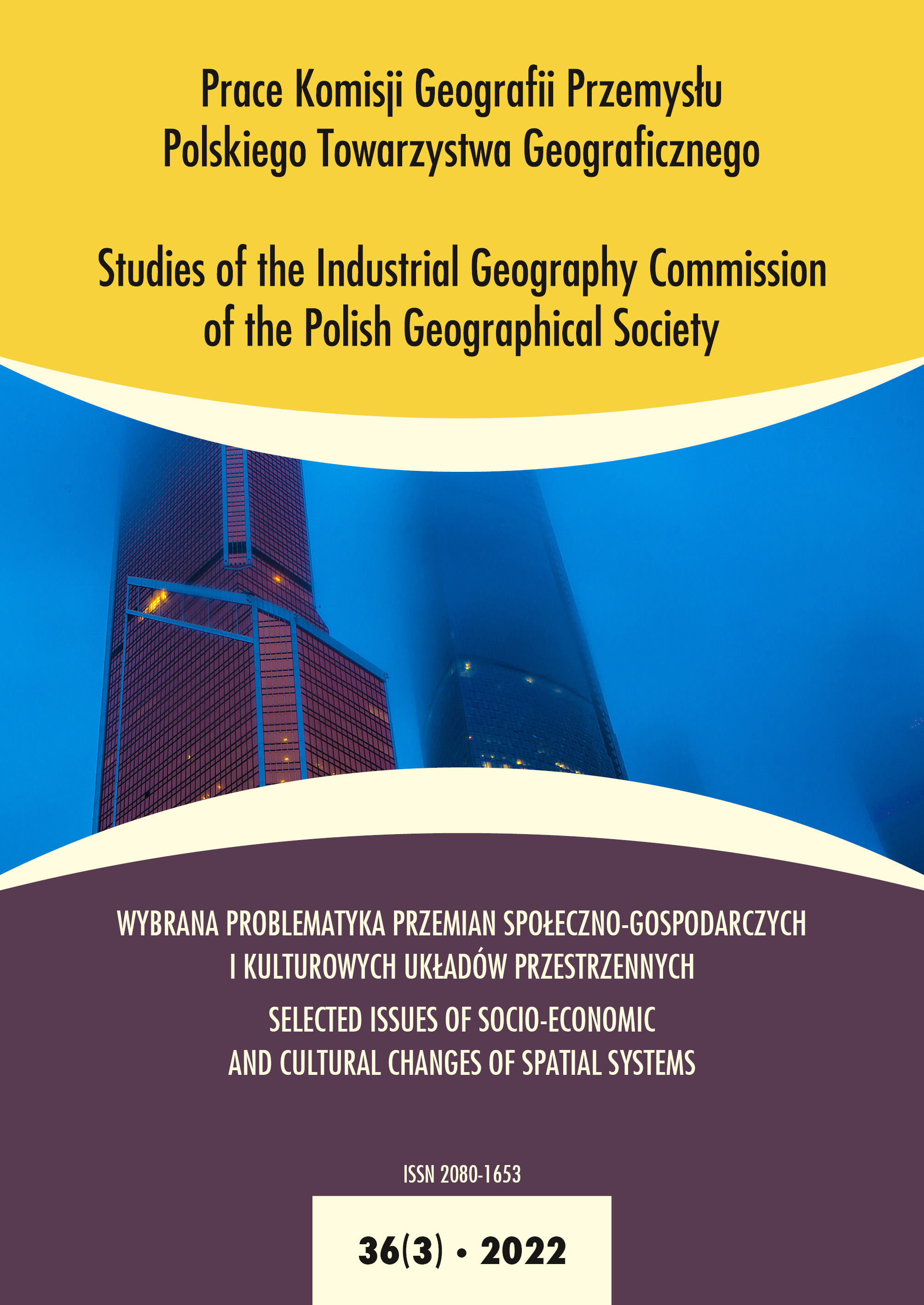The impact of the pandemic on the functioning of selected cultural institutions in Krakow and Katowice
DOI:
https://doi.org/10.24917/20801653.363.6Keywords:
cultural function of cities, cultural institutions, Katowice, Kraków, Covid-19 pandemicAbstract
One of basic needs of society, especially of a highly developed one, is satisfying non-material needs, including participation in culture. Thus, cultural activity becomes a popular and widespread phenomenon. The COVID-19 pandemic had a strong impact on the cultural sphere of Polish cities. All cultural institutions had to deal with the frequently changing rules of their functioning and adjust to the sanitary regime. The work aims to illustrate significant changes introduced as a result of the pandemic in the functioning of the cultural zone of Krakow and Katowice (Poland). Conversations and interviews with representatives of selected institutions allowed to draw the attention to the basic problems of their functioning. Moreover, on the basis of the survey conducted among the recipients of culture, the use and the degree of satisfaction with the implemented solutions were also shown. The research shows that all surveyed institutions quickly began to create remote means of contact with the respondent. Nevertheless, the interest in the activities of cultural institutions during the pandemic was, as one might expect, significantly limited. The expected impact of the pandemic period on the functioning of cultural institutions in the future, however, seems paradoxically positive. All institutions agree that most of the major events will be more online in the future, becoming hybrid events, which can help attract the attention of a younger audience.
Downloads
Metrics
References
Alamineh, G.A. (2022). The Nexus between coronavirus and tourism: Tourism as peace sensitive industry. Cogent Arts & Humanities, 9(1), 2014110.
Coles, T., Garcia, G., O’Malley, E., Turner, C. (2021). Experiencing Event Management During the Coronavirus Pandemic: A Public Sector Perspective. Frontiers in Sports and Active Living, 3.
Długoborski W., Dutkiewicz H., Dziewoński M. (1976). Katowice: ich dzieje i kultura na tle regionu. Warszawa: Śląski Instytut Naukowy.
Gogiel-Kuźmicka, A. (2015). Usługi elektroniczne oferowane przez biblioteki. Biuletyn EBIB, 155, 1–6.
Jakubik, P. (2021). Funkcjonowanie domów kultury w pierwszym roku pandemii COVID-19. Praca magisterska, Uniwersytet Jagielloński. Kraków.
Jeannotte, M.S. (2021). When the gigs are gone: Valuing arts, culture and media in the COVID-19 pandemic. Social Sciences & Humanities Open, 3(1), 100097.
Kaczmarczyk, S. (2014). Klasyfikacja metod zbierania danych ze źródeł pierwotnych w badaniach marketingowych. Studia Ekonomiczne, 195, 55–64.
Klasik, A., Świątkiewicz, W., Drobniak, A., Wrana, K. (2011). Strategia rozwoju kulturalnego Katowic 2020+. Biuletyn Komitetu Przestrzennego Zagospodarowania Kraju PAN, 246, 107127.
Klekotko, M., Stępniak, M., Szklarczyk, D., Kubecka, M. (2015). Kulturowy pejzaż polskich miast: przypadek Warszawy, Krakowa i Katowic. W: M. Klekotko, C.J. Navarro (red.), Wymiary kulturowe polskich miast i miasteczek. Kraków: Wydawnictwo Uniwersytetu Jagiellońskiego, 161–229.
Kolasińska, A. (2020). Wykorzystanie e-usług w udostępnianiu dziedzictwa kulturowego na przykładzie krakowskich muzeów. Annales Universitas Paedagogicae Cracoviensis. Studia Geographica, 15 , 40–49.
Paprocki, R. (2020). Postawy względem pandemii COVID-19. Kultura jako sterownik zachowań w warunkach ryzyka i niepewności. Pomiary Automatyka Robotyka, 24, 41–46.
Petroniec, J. (2021). Funkcjonowanie wybranych placówek kultury w Katowicach w czasie pandemii. Praca magisterska, Instytut Geografii, Uniwersytet Pedagogiczny w Krakowie. Kraków.
Radermecker, AS.V. (2021). Art and culture in the COVID-19 era: for a consumer-oriented approach. SN Business & Economics, 1, 4. doi: https://doi.org/10.1007/s43546-020-00003-y
Rokosz-Lempart, K. (2021). Funkcjonowanie wybranych instytucji kultury w Krakowie w czasie pandemii. Praca magisterska, Instytut Geografii, Uniwersytet Pedagogiczny w Krakowie. Kraków.
Szara, K., Frejtag-Mika, E. (2021). Wpływ ograniczeń epidemiologicznych COVID-19 na działalność instytucji kultury w Polsce. Nierówności społeczne a wzrost gospodarczy, 65, 212–223.
Szewczyk, A. (2014). Analiza usług elektronicznych branży rozrywkowej i działalności kulturalnej. Zeszyty Naukowe Uniwersytetu Szczecińskiego. Studia Informatica, 35, 165–187.
UNESCO. (2020). In moments of crisis, people need culture. Pozyskano z: https://en.unesco.org/news/moments-crisis-people-need-culture (dostęp: 13.09.2021).
Downloads
Published
How to Cite
Issue
Section
License
Copyright (c) 2022 Studies of the Industrial Geography Commission of the Polish Geographical Society

This work is licensed under a Creative Commons Attribution-NoDerivatives 4.0 International License.
Articles are published under the terms of the Creative Commons License (CC BY-ND 4.0; Attribution– NoDerivs).

